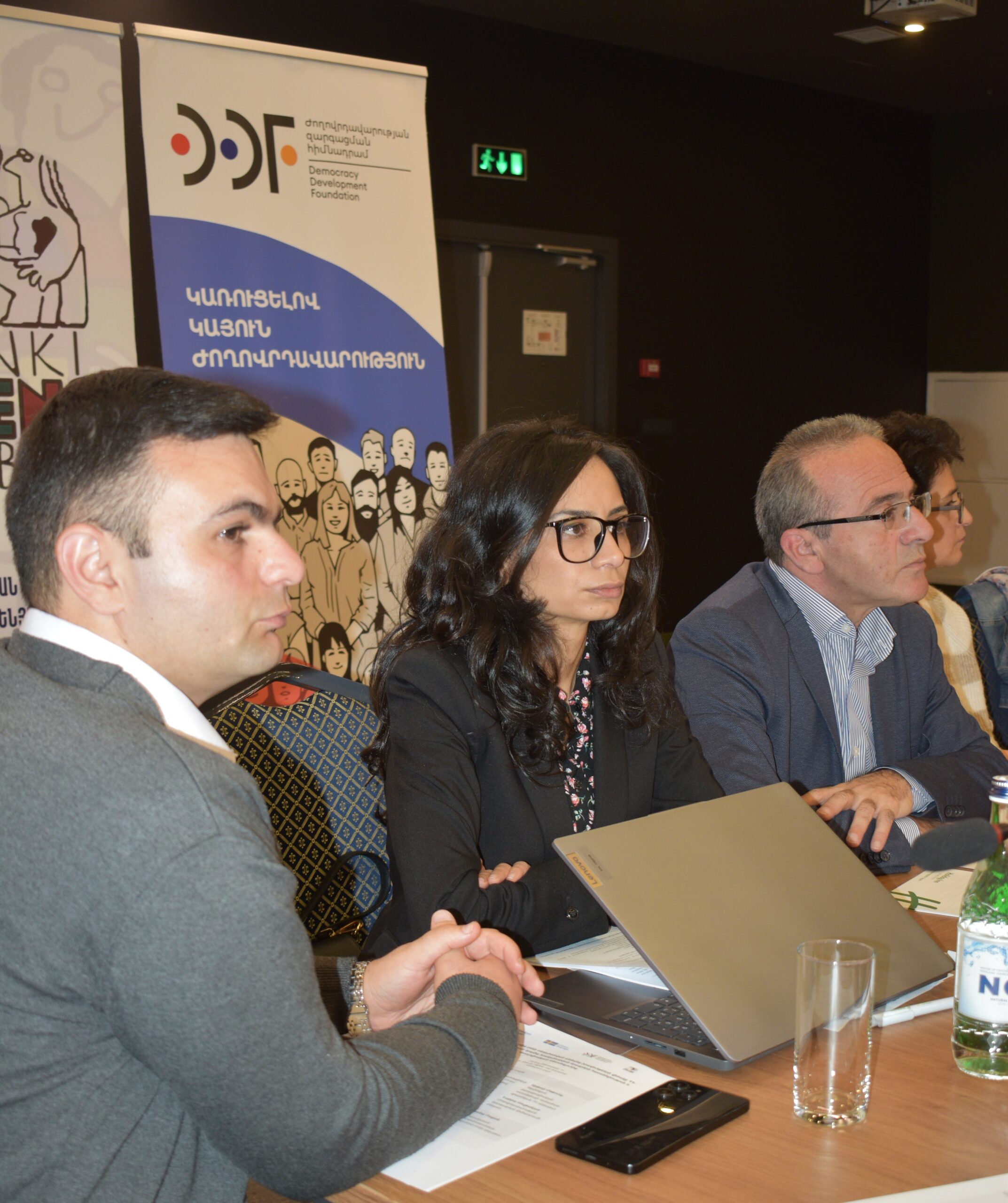On October 14, 2024, the discussion took place organized by HCAV on the situation of rights of persons forcibly displaced from Nagorno Karabakh in the Republic of Armenia from the point of view of accessibility and affordability of programs implemented by the RA government. Since October 1, 2023, HCAV, with the support of Freedom House, Democracy Development Foundation, and Sweden, has implemented the legal support program for forcibly displaced persons from Nagorno Karabakh. On October 14, we represented the results of the program, the obstacles, and had a constructive dialogue to solve the recorded problems.
During the discussion, the coordinator of the legal department of HCAV, Ani Chatinyan, represented the legal support program for the persons forcibly displaced from Artsakh.
Since October 1, HCAV has provided legal support to more than 1900 forcibly displaced persons in all regions of RA and Yerevan with the involvement of contact persons and lawyers (one contact person for each region and two contact persons in Yerevan).
As a result of legal counsel, within the framework of recorded problems, letters and claims have been sent to different state bodies.
- 349 letters to the Ministry of Labor and Social Affairs of the Republic of Armenia
- 47 letters to the Ministry of Internal Affairs of the Republic of Armenia
- 15 letters to the Ministry of Health of the Republic of Armenia
- 17 letters to the RA Government Humanitarian Center
- 2 crime reports to the General Prosecutor’s Office of the Republic of Armenia
- 9 letters to the Ministry of Justice of the Republic of Armenia
- 3 letters to the Ministry of Defense of the Republic of Armenia
- 2 letters to the Ministry of Finance of the Republic of Armenia (Central Bank)
- 3 applications to the Civil Court of General Jurisdiction of the Republic of Armenia (2 applications with the request for confirmation of facts of legal significance).
- 1 application requesting the fact of the birth of a child.
HCAV, within the framework of the discussion, referring to the frequently encountered problems, raised the issue of house support for Artsakh people. Chatinyan notes that in order to apply for the house support program, the mandatory requirement of RA citizenship is discriminatory treatment towards forcibly displaced Artsakh residents. The forcibly displaced persons have noted that when they wanted to have a call with the employees of the state bodies on some issue, they almost couldn’t get in touch and get a clarification related to their applications and received rejections.
According to Chatinyan, the vast majority of Artsakh people who they met with had the problem of accessibility of information regarding the house support and the other programs. “No matter how much state bodies state that they have carried out information awareness, we still have to take into account that we deal with people who have found themselves in difficult life situations, who have problems of integration, and who immediately had health problems after the displacement.”
HCAV and the Advanced Public Research Group conducted sociological research within the framework of the Decent Work Now program. Liana Balyan, one of the speakers of the discussion and the head of the Advanced Public Research Group, represented the results of the sociological research during the discussion. The research was dedicated to the state of the labor rights of forcibly displaced persons from Nagorno Karabakh. Excerpts from the research are represented below:
- 42.9 percent of the forcibly displaced Artsakh residents who participated in the survey stated that they have a job in Armenia. 68.5 percent of respondents said that they are paid lower in Armenia than in Artsakh.
- 79.4 percent of Artsakh residents live on rent in Armenia.
- The majority of surveyed Artsakh residents have noted that the average monthly income of their families is 150-350 thousand drams.
- Turning to the question of what the situation in Armenia will be, 32.9 percent of the surveyed Artsakh residents said that the situation will worsen, 19.3 percent said that it will worsen sharply, and 15.5 percent said that it will improve drastically. 52.8 percent of the surveyed Artsakh residents said that they want to work and live in Armenia.
- When asked the question “What are your future plans for work?” 6.8 percent of surveyed Artsakh residents said that they are going to leave for the Russian Federation, 7.6 percent said that they intend to go to other countries, 12.8 percent found it difficult to answer the question, 19.5 percent expressed a desire to return Artsakh, and 52.8 percent stated that they are going to work and live in Armenia.

